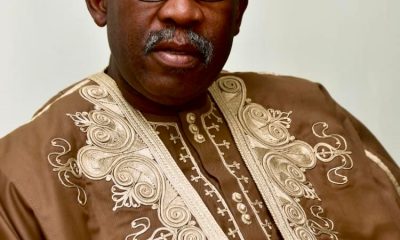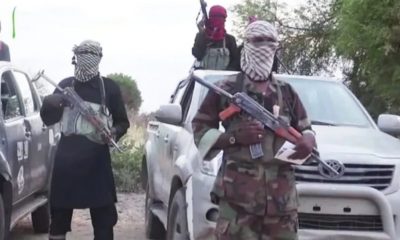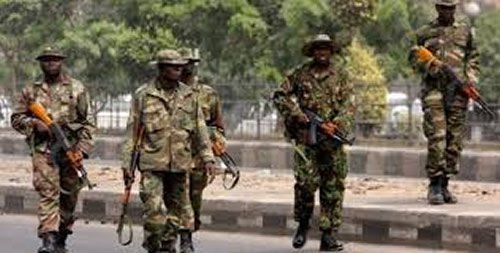society
Lai Mohammed Lied, FG Paid ‘Large Ransom’ To Free Dapchi Girls – UN Report

Over 100 girls were kidnapped from the Dapchi school by a Boko Haram faction in February this year with about 105 of them later released by the terrorists. One of them, Leah Sharibu, who reportedly refused to denounce her Christian faith, is still with the abductors.
Following the release of the girls, about a month after they were kidnapped, Mr Mohammed told journalists that it was not true ransom was paid for their release.
‘’It is not true that we paid ransom for the release of the Dapchi girls, neither was there a prisoner swap to secure their release,” Mr. Mohammed told journalists in Maiduguri with his statement circulated by his office to media organisations including PREMIUM TIMES.
“What happened was that the abduction itself was a breach of the ceasefire talks between the insurgents and the government; hence it became a moral burden on the abductors. Any report that we paid ransom or engaged in prisoner swap is false.”
A UN report has now shown Mr Mohammed’s claim to be false.
The report recently submitted to the UN Security Council on Boko Haram and related terrorist organisations, said such ransom and the predominance of cash economy was providing oxygen for the insurgency around the Lake Chad region.
The UN report is titled “22nd Report of the Analytical Support and Sanctions Monitoring Team”, related to Resolution 2368 (2017) regarding “Islamic State in Iraq and the Levant – ISIL – (Da’esh), Al-Qaida and associated individuals and entities.”
“In Nigeria, 111 schoolgirls from the town of Dapchi were kidnapped on 18 February 2018 and released by ISWAP on 21 March 2018 in exchange for a large ransom payment,” the report stated.
The UN report negating the Nigerian government’s stance reflects the manner of propaganda the Nigerian government and its military have been using to fight the war against Boko Haram.
PREMIUM TIMES reported how the Nigerian military has repeatedly lied about military casualty in the war and, along with the government, claimed the Boko Haram sect was already defeated.
The government’s stance appears to be that suppressing information, or as in this case lying about it, would reduce the efficacy of the insurgents and thus limit their ability to carry out their terrorist acts.
The Dapchi girl’s ransom would not be the first by the Nigerian government to free victims held by Boko Haram. Huge ransom was also paid by the Buhari administration to free many of released Chibok girls kidnapped in 2014, senators including the leader of ruling party in the Senate, Ahmed Lawan, said. Although the move is largely welcomed by many Nigerians as it ensures freedom for the victims, experts fear it has helped fuel the insurgency by ensuring the Boko Haram has access to funds to buy more weapons and sustain themselves; a stance shared in the UN report.
OTHER SOURCES OF FUNDING
Apart from ransom, the UN also listed other ways the Boko Haram group is being funded.
“…extortion, charitable donations, smuggling, remittances and kidnapping as parts of ways Boko Haram is funded,” the report stated as quoted by the News Agency of Nigeria.
The report also stated how some “doctrinally based non-governmental organisations” were funding Boko Haram and other terror groups.”
“The number of doctrinally based non-governmental organisations sending funds to local terrorist groups was growing, and Member States were concerned that radicalisation was increasing the threat level in the Sahel.
“Meanwhile, Boko Haram (QDe.138) and the Islamic State West Africa Province (ISWAP) have had a similar impact in their areas of control, including the Lake Chad basin.
“The predominance in the region of the cash economy, without controls, is conducive to terrorist groups funded by extortion, charitable donations, smuggling, remittances and kidnapping.”
According to NAN, “the report was signed by Edmund Fitton-Brown, Coordinator, Analytical Support and Sanctions Monitoring Team, who said the report was “comprehensive and independent”, and Kairat Umarov, Chair, Security Council Committee.
SANCTIONS ON BOKO HARAM
The UN Security Council committee on al Qaeda sanctions blacklisted and imposed sanctions on the Boko Haram in 2014 after the insurgents kidnapped more than 200 Chibok schoolgirls.
The designation, which came into effect after no objections were raised by the Security Council’s 15 members, subjected Boko Haram to UN sanctions, including an arms embargo, asset freeze and travel ban.
The UN Security Council had last week said it remained concerned over the security and humanitarian situation caused by the Boko Haram terrorists and other armed groups in Nigeria, Cameroon and Chad.
In a presidential statement, the 15-member body regretted that Central African countries were beset by terrorist activity, instability and the effects of climate change, and asked Secretary-General Antonio Guterres to review the work of the UN Regional Office for Central Africa (UNOCA), and recommend areas for improvement.
The presidential statement read: “The Security Council strongly condemns all terrorist attacks carried out in the region, including those perpetrated by Boko Haram and the Islamic State in Iraq and the Levant (ISIL, also known as Daesh).
“These attacks have caused large-scale and devastating losses, have had a devastating humanitarian impact including through the displacement of a large number of civilians in Nigeria, Cameroon and Chad, and represent a threat to the stability and peace of West and Central Africa.
“The Council notes with particular concern the continuing use by Boko Haram of women and girls as suicide bombers, which has created an atmosphere of suspicion towards them and made them targets of harassment and stigmatisation in affected communities, and of arbitrary arrests by security forces.
“The Council emphasises the need for affected States to counter-terrorism in all its forms and manifestations, including by addressing the conditions conducive to the spread of terrorism, in accordance with obligations under international law, in particular international human rights law, international refugee law and international humanitarian law”.
The Security Council welcomed the support provided by UNOCA and the UN Office for West Africa and Sahel (UNOWAS) for the development of a joint regional strategy to address the root causes of the Lake Chad Basin crisis through regular contact with regional leaders.
The Council encouraged partners to increase security assistance to Lake Chad Basin Commission countries, and humanitarian and development support across the region for those affected by Boko Haram activities.
“The Security Council remains deeply concerned at the grave security situation and related violations and abuses of human rights in parts of Central Africa, in particular, the continuing terrorist activities of Boko Haram and other terrorist groups in the Lake Chad Basin,” it said.
“The Security Council expresses its ongoing concern at continued tensions linked to disputed electoral processes, social and economic difficulties, and conflicts between farmers and herders,” the statement added.
The 15-member Council noted that UNOCA’s priorities would include to work closely with UNOWAS to address trans-regional issues such as maritime security in the Gulf of Guinea, conflict between farmers and herders, and combating Boko Haram.
society
Ramadan: Adron Homes Felicitates Muslims, Preaches Hope and Unity

Ramadan: Adron Homes Felicitates Muslims, Preaches Hope and Unity
Adron Homes & Properties Limited has congratulated Muslim faithful on the commencement of the holy month of Ramadan, urging Nigerians to embrace the virtues of sacrifice, discipline, and compassion that define the season.
In a statement made available to journalists, the company described Ramadan as a period of deep reflection, spiritual renewal, and strengthened devotion to faith and humanity.
According to the management, the holy month represents values that align with the organisation’s commitment to integrity, resilience, and community development.
“Ramadan is a time that teaches patience, generosity, and selflessness. As our Muslim customers and partners begin the fast, we pray that their sacrifices are accepted and that the season brings peace, joy, and renewed hope to their homes and the nation at large,” the statement read.
The firm reaffirmed its dedication to providing affordable and accessible housing solutions to Nigerians, noting that building homes goes beyond structures to creating environments where families can thrive.
Adron Homes further urged citizens to use the period to pray for national unity, economic stability, and sustainable growth.
It wished all Muslim faithful a spiritually fulfilling Ramadan.
Ramadan Mubarak.
society
Underfunding National Security: Envelope Budgeting Fails Nigeria’s Defence By George Omagbemi Sylvester

Underfunding National Security: Envelope Budgeting Fails Nigeria’s Defence
By George Omagbemi Sylvester | Published by saharaweeklyng.com
“Fiscal Rigidity in a Time of Crisis: Lawmakers Say Fixed Budget Ceilings Are Crippling Nigeria’s Fight Against Insurgency, Banditry, and Organized Crime.”
Nigeria’s legislature has issued a stark warning: the envelope budgeting system; a fiscal model that caps spending for ministries, departments, and agencies (MDAs) is inadequate to meet the country’s escalating security challenges. Lawmakers and budget analysts argue that rigid fiscal ceilings are undermining the nation’s ability to confront insurgency, banditry, kidnapping, separatist violence, oil theft and maritime insecurity.
The warning emerged during the 2026 budget defence session for the Office of the National Security Adviser (ONSA) at the National Assembly in Abuja. Senator Yahaya Abdullahi (APC‑Kebbi North), chairman of the Senate Committee on National Security and Intelligence, decried the envelope system, noting that security agencies “have been subject to the vagaries of the envelope system rather than to genuine needs and requirements.” The committee highlighted non-release or partial release of capital funds from previous budgets, which has hindered procurement, intelligence and operational capacity.
Nigeria faces a multi‑front security crisis: persistent insurgency in the North‑East, banditry and kidnappings across the North‑West and North‑Central, separatist tensions in the South‑East, and piracy affecting Niger Delta oil production. Despite declarations of a national security emergency by President Bola Tinubu, lawmakers point to a “disconnect” between rhetoric and the actual fiscal support for agencies tasked with enforcement.
Experts warn that security operations demand flexibility and rapid resource allocation. Dr. Amina Bello, a public finance specialist, said: “A static budget in a dynamic threat environment is like sending firefighters with water jugs to a forest fire. You need flexibility, not fixed ceilings, to adapt to unforeseen developments.”
The Permanent Secretary of Special Services at ONSA, Mohammed Sanusi, detailed operational consequences: irregular overhead releases, unfulfilled capital appropriations, and constrained foreign service funds. These fiscal constraints have weakened intelligence and covert units, hampering surveillance, cyber‑security, counter‑terrorism and intelligence sharing.
Delayed capital releases have stalled critical projects, including infrastructure upgrades and surveillance systems. Professor Kolawole Adeyemi, a governance expert, emphasized that “budgeting for security must allow for rapid reallocation in response to threats that move faster than political cycles. Envelope budgeting lacks this essential flexibility.”
While the National Assembly advocates fiscal discipline, lawmakers stress that security funding requires strategic responsiveness. Speaker Abbas Ibrahim underscored that security deserves “prominent and sustained attention” in the 2026 budget, balancing oversight with operational needs.
In response, the Senate committee plans to pursue reforms, including collaboration with the executive to restructure funding, explore supplementary budgets and ensure predictable and sufficient resources for security agencies. Experts warn that without reform, criminal networks will exploit these gaps, eroding public trust.
As one policy analyst summarized: “A nation declares a security emergency; but if its budget does not follow with real resources and oversight, the emergency remains rhetorical.” Nigeria’s debate over envelope budgeting is more than an accounting dispute; it is a contest over the nation’s security priorities and its commitment to safeguarding citizens.
society
Rev. Mother Kehinde Osoba (Eritosin) Celebrates as She Marks Her Birthday

Rev. Mother Kehinde Osoba (Eritosin) Celebrates as She Marks Her Birthday
Today, the world and the body of Christ rise in celebration of a rare vessel of honour, Rev. Mother Kehinde Osoba, fondly known as Eritosin, as she marks her birthday.
Born a special child with a divine mark of grace, Rev. Mother Eritosin’s journey in God’s vineyard spans several decades of steadfast service, spiritual depth, and undeniable impact. Those who know her closely describe her as a prophetess with a heart of gold — a woman whose calling is not worn as a title, but lived daily through compassion, discipline, humility, and unwavering faith.
From her early days in ministry, she has touched lives across communities, offering spiritual guidance, prophetic insight, and motherly counsel. Many testify that through her prayers and teachings, they encountered God in a deeply personal and transformative way. Near and far, her influence continues to echo — not only within church walls, but in homes, families, and destinies reshaped through her mentorship.
A mother in every sense of the word, Rev. Mother Kehinde Osoba embodies nurture and correction in equal measure. As a grandmother, she remains energetic in purpose — accommodating the wayward, embracing the rejected, and holding firmly to the belief that no soul is beyond redemption. Her life’s mission has remained consistent: to lead many to Christ and guide them into the light of a new beginning.
Deeply rooted within the C&S Unification, she stands tall as a spiritual pillar in the Cherubim and Seraphim Church globally. Her dedication to holiness, unity, and prophetic service has earned her widespread respect as a spiritual matriarch whose voice carries both authority and humility.
As she celebrates another year today, tributes continue to pour in from spiritual sons and daughters, church leaders, and admirers who see in her a living reflection of grace in action.
Prayer for Rev. Mother Kehinde Osoba (Eritosin)
May the Almighty God, who called you from birth and anointed you for His service, continually strengthen you with divine health and renewed vigour.
May your oil never run dry, and may your prophetic mantle grow heavier with greater glory.
May the lives you have nurtured rise to call you blessed.
May your latter years be greater than the former, filled with peace, honour, and the visible rewards of your labour in God’s vineyard.
May heaven continually back your prayers, and may your light shine brighter across nations.
Happy Birthday to a true Mother in Israel — Rev. Mother Kehinde Osoba (Eritosin).
More years.
More anointing.
More impact.
If you want this adapted for a newspaper page, church bulletin, Facebook post, or birthday flyer, just tell me the format and tone.
-

 celebrity radar - gossips6 months ago
celebrity radar - gossips6 months agoWhy Babangida’s Hilltop Home Became Nigeria’s Political “Mecca”
-

 society6 months ago
society6 months agoPower is a Loan, Not a Possession: The Sacred Duty of Planting People
-

 society5 months ago
society5 months agoReligion: Africa’s Oldest Weapon of Enslavement and the Forgotten Truth
-

 news6 months ago
news6 months agoTHE APPOINTMENT OF WASIU AYINDE BY THE FEDERAL GOVERNMENT AS AN AMBASSADOR SOUNDS EMBARRASSING











You must be logged in to post a comment Login